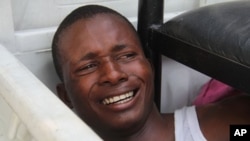Congolese authorities arrested protesters in the eastern city of Goma Tuesday after breaking up a demonstration against the re-election of President Joseph Kabila. Local authorities say they don't want opposition rallies in town for security reasons.
It appears to be business as usual Tuesday in most of Goma, the capital of North Kivu province. The shops are open and markets are packed.
But in one of the main squares of this provincial capital, dozens of riot police and soldiers stood guard hours after they broke up a planned demonstration, before it really began. Organizers say between 50 and 100 people had gathered to get their signs ready and then they were surrounded.
Alidor Mbuyamba heads the regional youth league for the party of opposition leader and second-place finisher Etienne Tshisekedi. He says his party and other opposition parties support Tshisekedi’s claim to victory, and that the November 28 election was a fraud.
Mbuyamba says as demonstrators got ready for the protest this morning, police ordered them to leave, and when they refused to go, scattered the crowd with tear gas and intimidation tactics.
The mayor of Goma, Jean Busanga, says tear gas was not used to disperse the crowd, which was gathered illegally.
He says organizers submitted their authorization claim too late, and that he appeared on state radio on Sunday warning people not to attend the demonstration. The mayor says two people were arrested, but does not give names.
Opposition officials count five arrests. They say they include the head of the local chapter of the Union for Democracy and Social Progress, the party of Tshisekedi, and the local head of the Union for the Nation of Congo, the party of Vital Kamerhe, who came in third in the presidential race with 7.7 percent of the vote.
The mayor says the arrests were a simple security measure, to prevent looting and rioting in the streets.
The mayor says peaceful protests are allowed in Goma, but he doesn’t want people demonstrating against the election.
Human Rights Watch says that in the days leading up to the vote, at least 18 people were killed and 100 were injured in demonstrations in the capital, Kinshasa - mostly by government troops. And while tempers may be high in this war-torn province, many people, like the mayor, say they can't take any more violence.
East Congo Protesters Arrested





